Organisational Behaviour Report: IHG, Culture, Motivation & Teams
VerifiedAdded on 2023/01/12
|16
|4455
|2
Report
AI Summary
This report examines organisational behaviour within Intercontinental Hotels (IHG). It begins by analyzing IHG's organisational culture, power dynamics, and political landscape, exploring their influence on individual and team behaviour, referencing Handy's model and power types. The report then evaluates process and content theories of motivation, particularly Maslow's Hierarchy of Needs and Equity theory, to understand how IHG can effectively motivate its employees to achieve organizational goals. Furthermore, the report assesses effective versus ineffective team dynamics, and concludes by applying concepts and philosophies of organisational behaviour within the context of IHG. The report provides a comprehensive overview of how organisational behaviour principles can be applied to improve performance and achieve strategic objectives within a hospitality setting.
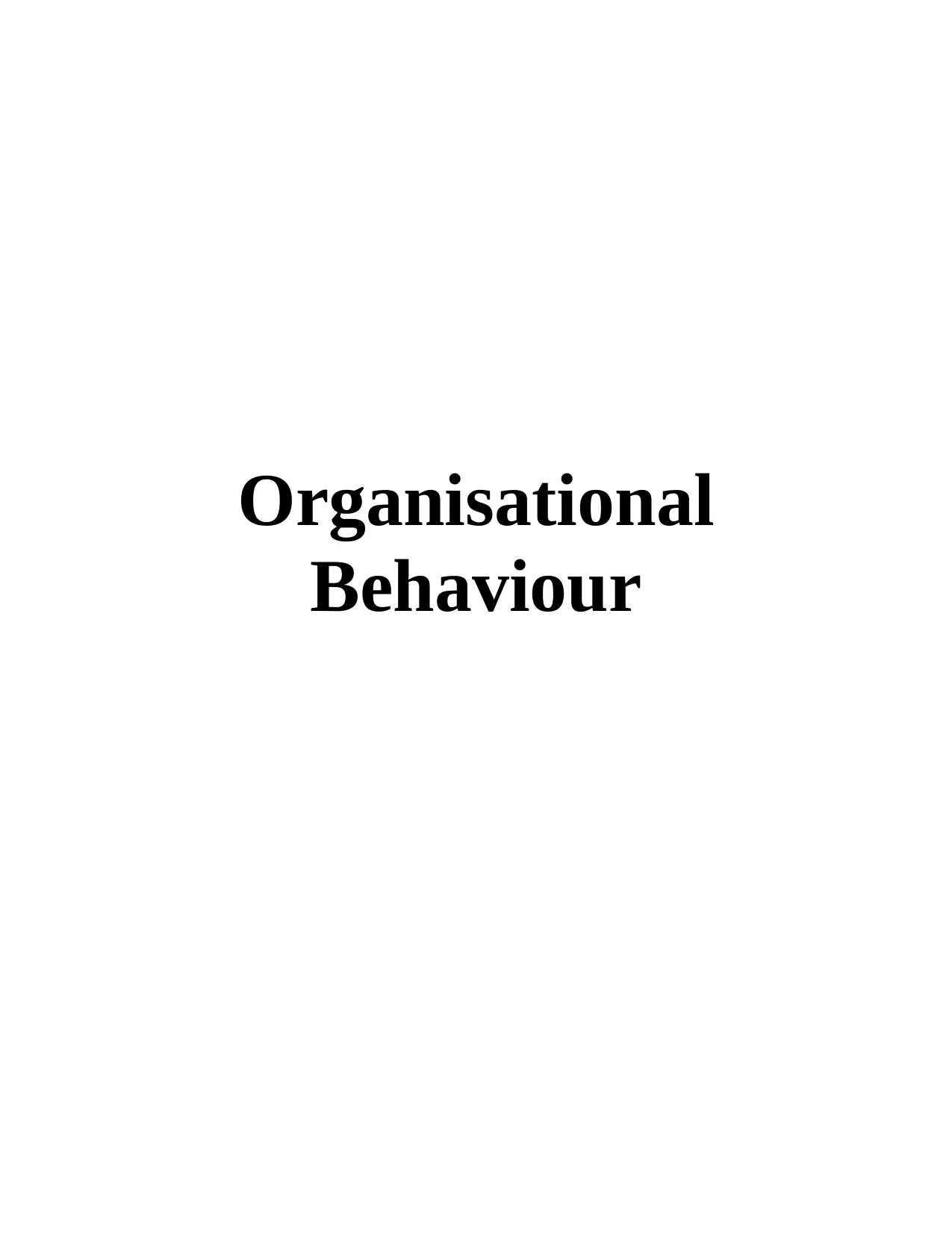
Organisational
Behaviour
Behaviour
Paraphrase This Document
Need a fresh take? Get an instant paraphrase of this document with our AI Paraphraser
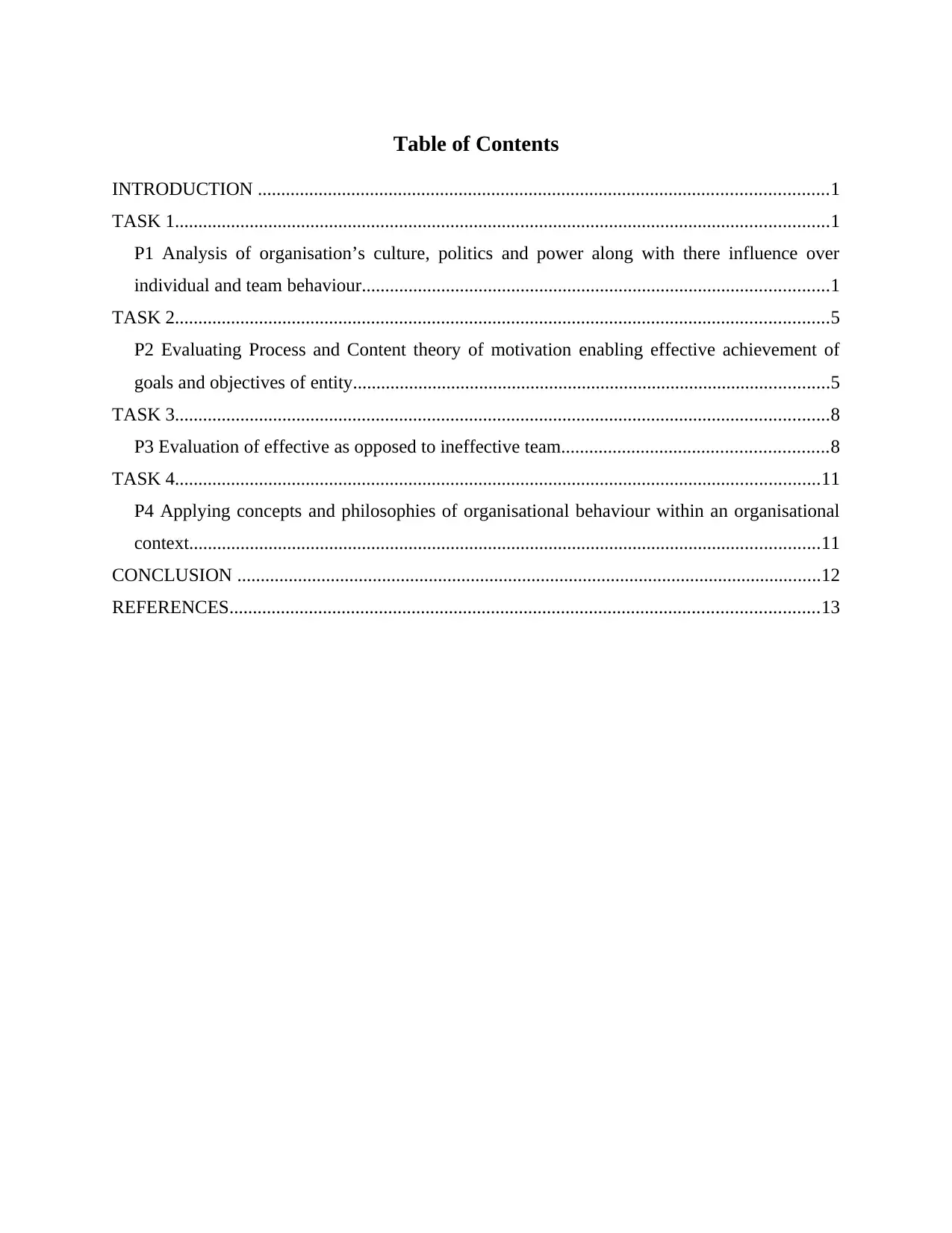
Table of Contents
INTRODUCTION ..........................................................................................................................1
TASK 1............................................................................................................................................1
P1 Analysis of organisation’s culture, politics and power along with there influence over
individual and team behaviour....................................................................................................1
TASK 2............................................................................................................................................5
P2 Evaluating Process and Content theory of motivation enabling effective achievement of
goals and objectives of entity......................................................................................................5
TASK 3............................................................................................................................................8
P3 Evaluation of effective as opposed to ineffective team.........................................................8
TASK 4..........................................................................................................................................11
P4 Applying concepts and philosophies of organisational behaviour within an organisational
context.......................................................................................................................................11
CONCLUSION .............................................................................................................................12
REFERENCES..............................................................................................................................13
INTRODUCTION ..........................................................................................................................1
TASK 1............................................................................................................................................1
P1 Analysis of organisation’s culture, politics and power along with there influence over
individual and team behaviour....................................................................................................1
TASK 2............................................................................................................................................5
P2 Evaluating Process and Content theory of motivation enabling effective achievement of
goals and objectives of entity......................................................................................................5
TASK 3............................................................................................................................................8
P3 Evaluation of effective as opposed to ineffective team.........................................................8
TASK 4..........................................................................................................................................11
P4 Applying concepts and philosophies of organisational behaviour within an organisational
context.......................................................................................................................................11
CONCLUSION .............................................................................................................................12
REFERENCES..............................................................................................................................13
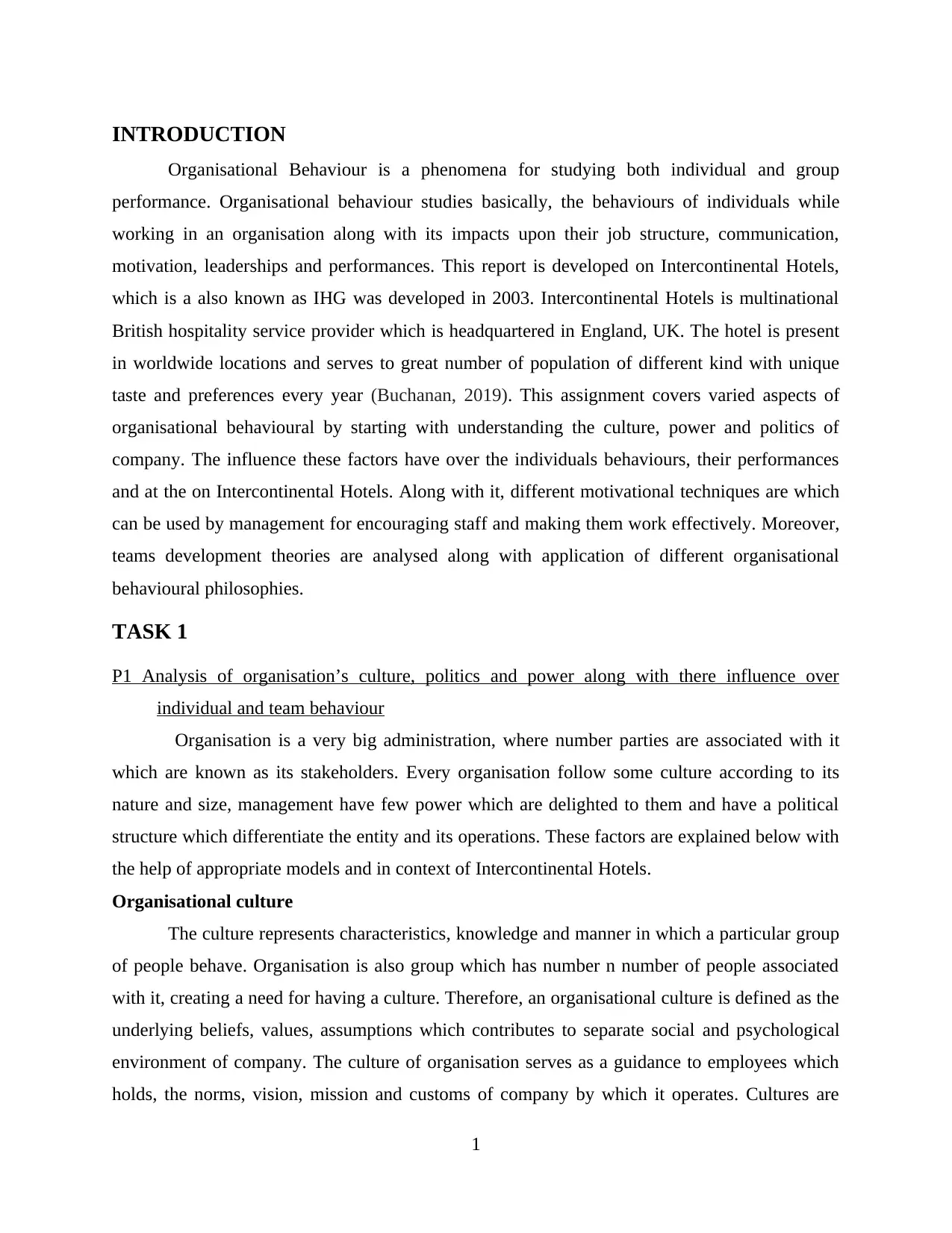
INTRODUCTION
Organisational Behaviour is a phenomena for studying both individual and group
performance. Organisational behaviour studies basically, the behaviours of individuals while
working in an organisation along with its impacts upon their job structure, communication,
motivation, leaderships and performances. This report is developed on Intercontinental Hotels,
which is a also known as IHG was developed in 2003. Intercontinental Hotels is multinational
British hospitality service provider which is headquartered in England, UK. The hotel is present
in worldwide locations and serves to great number of population of different kind with unique
taste and preferences every year (Buchanan, 2019). This assignment covers varied aspects of
organisational behavioural by starting with understanding the culture, power and politics of
company. The influence these factors have over the individuals behaviours, their performances
and at the on Intercontinental Hotels. Along with it, different motivational techniques are which
can be used by management for encouraging staff and making them work effectively. Moreover,
teams development theories are analysed along with application of different organisational
behavioural philosophies.
TASK 1
P1 Analysis of organisation’s culture, politics and power along with there influence over
individual and team behaviour
Organisation is a very big administration, where number parties are associated with it
which are known as its stakeholders. Every organisation follow some culture according to its
nature and size, management have few power which are delighted to them and have a political
structure which differentiate the entity and its operations. These factors are explained below with
the help of appropriate models and in context of Intercontinental Hotels.
Organisational culture
The culture represents characteristics, knowledge and manner in which a particular group
of people behave. Organisation is also group which has number n number of people associated
with it, creating a need for having a culture. Therefore, an organisational culture is defined as the
underlying beliefs, values, assumptions which contributes to separate social and psychological
environment of company. The culture of organisation serves as a guidance to employees which
holds, the norms, vision, mission and customs of company by which it operates. Cultures are
1
Organisational Behaviour is a phenomena for studying both individual and group
performance. Organisational behaviour studies basically, the behaviours of individuals while
working in an organisation along with its impacts upon their job structure, communication,
motivation, leaderships and performances. This report is developed on Intercontinental Hotels,
which is a also known as IHG was developed in 2003. Intercontinental Hotels is multinational
British hospitality service provider which is headquartered in England, UK. The hotel is present
in worldwide locations and serves to great number of population of different kind with unique
taste and preferences every year (Buchanan, 2019). This assignment covers varied aspects of
organisational behavioural by starting with understanding the culture, power and politics of
company. The influence these factors have over the individuals behaviours, their performances
and at the on Intercontinental Hotels. Along with it, different motivational techniques are which
can be used by management for encouraging staff and making them work effectively. Moreover,
teams development theories are analysed along with application of different organisational
behavioural philosophies.
TASK 1
P1 Analysis of organisation’s culture, politics and power along with there influence over
individual and team behaviour
Organisation is a very big administration, where number parties are associated with it
which are known as its stakeholders. Every organisation follow some culture according to its
nature and size, management have few power which are delighted to them and have a political
structure which differentiate the entity and its operations. These factors are explained below with
the help of appropriate models and in context of Intercontinental Hotels.
Organisational culture
The culture represents characteristics, knowledge and manner in which a particular group
of people behave. Organisation is also group which has number n number of people associated
with it, creating a need for having a culture. Therefore, an organisational culture is defined as the
underlying beliefs, values, assumptions which contributes to separate social and psychological
environment of company. The culture of organisation serves as a guidance to employees which
holds, the norms, vision, mission and customs of company by which it operates. Cultures are
1
⊘ This is a preview!⊘
Do you want full access?
Subscribe today to unlock all pages.

Trusted by 1+ million students worldwide
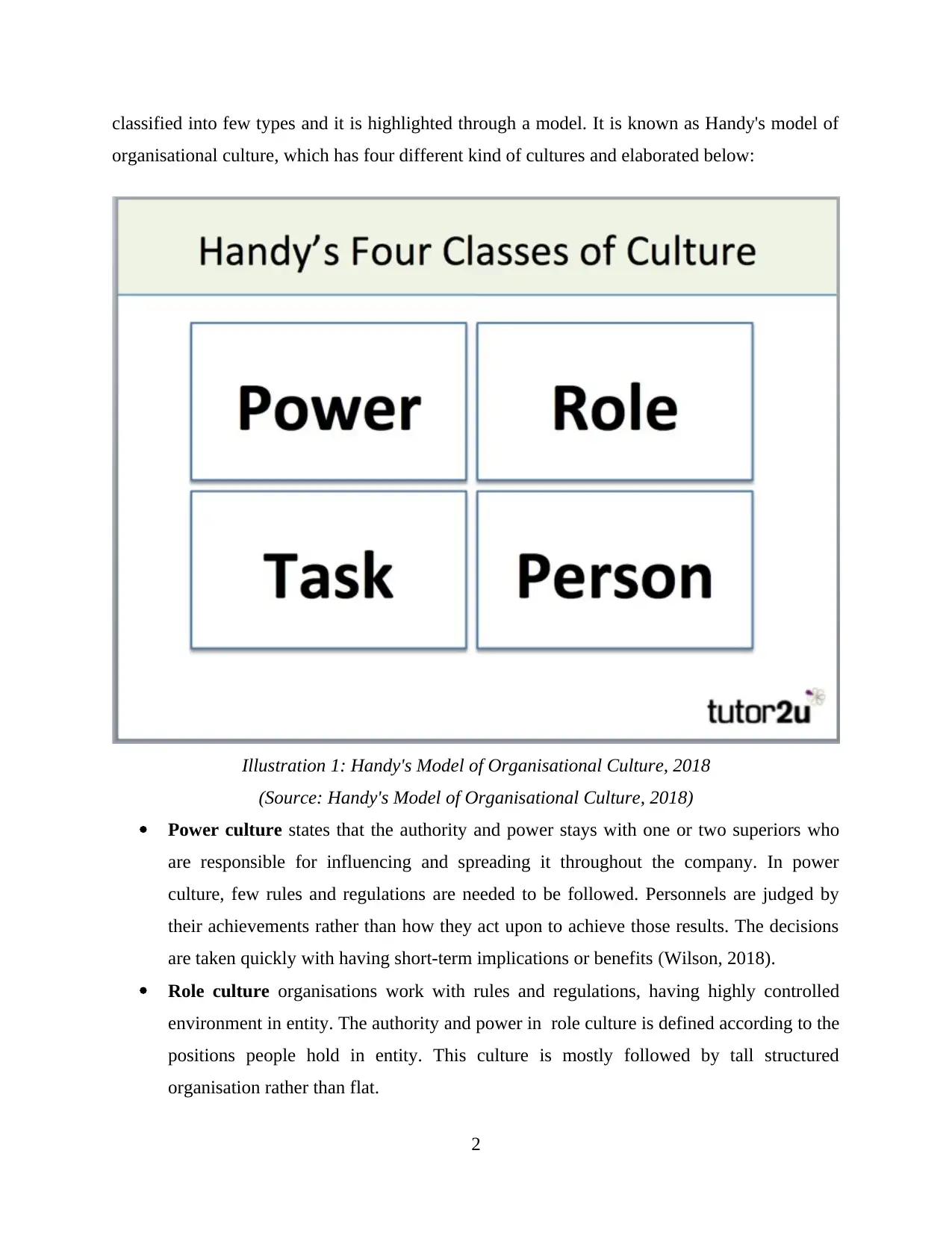
classified into few types and it is highlighted through a model. It is known as Handy's model of
organisational culture, which has four different kind of cultures and elaborated below:
(Source: Handy's Model of Organisational Culture, 2018)
Power culture states that the authority and power stays with one or two superiors who
are responsible for influencing and spreading it throughout the company. In power
culture, few rules and regulations are needed to be followed. Personnels are judged by
their achievements rather than how they act upon to achieve those results. The decisions
are taken quickly with having short-term implications or benefits (Wilson, 2018).
Role culture organisations work with rules and regulations, having highly controlled
environment in entity. The authority and power in role culture is defined according to the
positions people hold in entity. This culture is mostly followed by tall structured
organisation rather than flat.
2
Illustration 1: Handy's Model of Organisational Culture, 2018
organisational culture, which has four different kind of cultures and elaborated below:
(Source: Handy's Model of Organisational Culture, 2018)
Power culture states that the authority and power stays with one or two superiors who
are responsible for influencing and spreading it throughout the company. In power
culture, few rules and regulations are needed to be followed. Personnels are judged by
their achievements rather than how they act upon to achieve those results. The decisions
are taken quickly with having short-term implications or benefits (Wilson, 2018).
Role culture organisations work with rules and regulations, having highly controlled
environment in entity. The authority and power in role culture is defined according to the
positions people hold in entity. This culture is mostly followed by tall structured
organisation rather than flat.
2
Illustration 1: Handy's Model of Organisational Culture, 2018
Paraphrase This Document
Need a fresh take? Get an instant paraphrase of this document with our AI Paraphraser
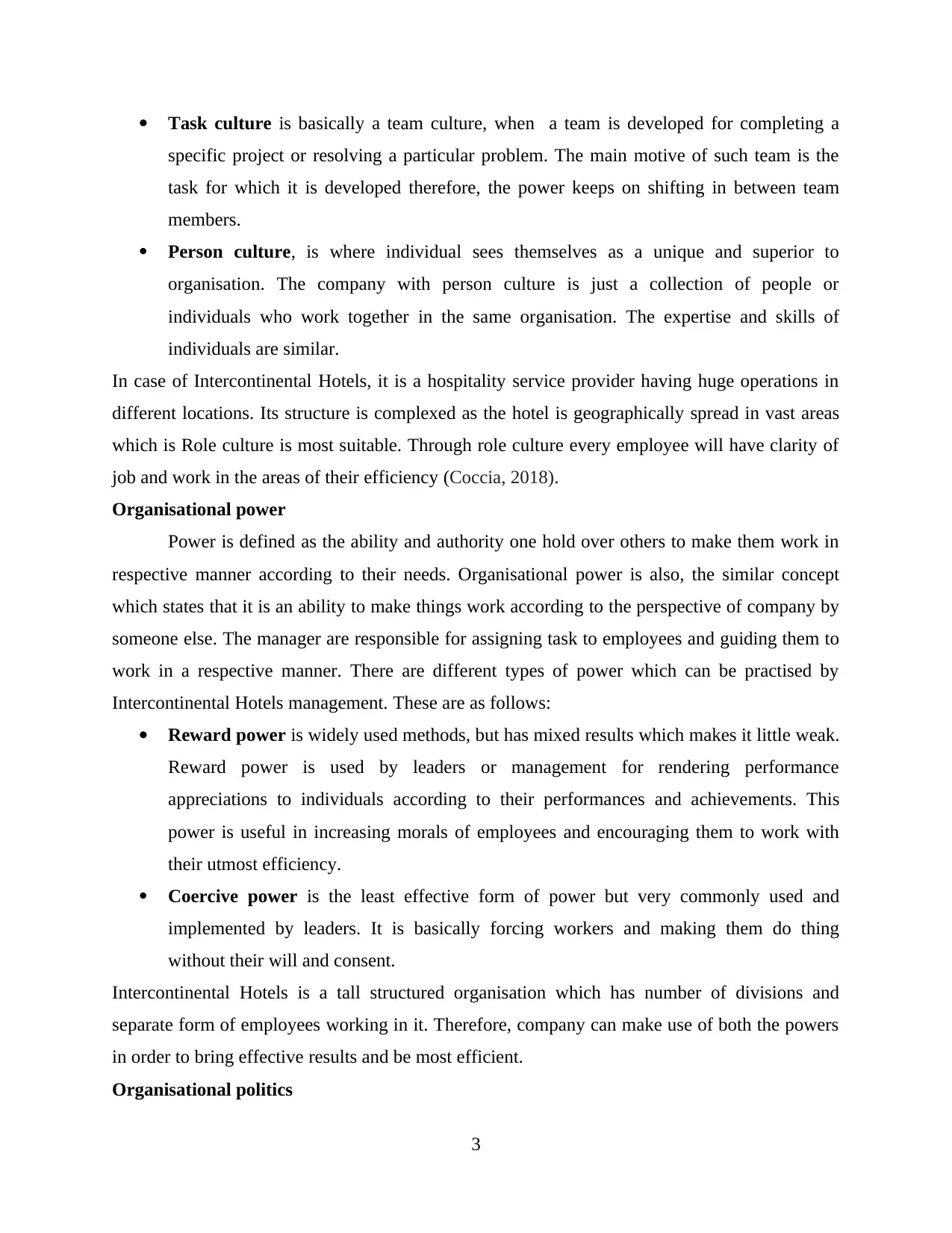
Task culture is basically a team culture, when a team is developed for completing a
specific project or resolving a particular problem. The main motive of such team is the
task for which it is developed therefore, the power keeps on shifting in between team
members.
Person culture, is where individual sees themselves as a unique and superior to
organisation. The company with person culture is just a collection of people or
individuals who work together in the same organisation. The expertise and skills of
individuals are similar.
In case of Intercontinental Hotels, it is a hospitality service provider having huge operations in
different locations. Its structure is complexed as the hotel is geographically spread in vast areas
which is Role culture is most suitable. Through role culture every employee will have clarity of
job and work in the areas of their efficiency (Coccia, 2018).
Organisational power
Power is defined as the ability and authority one hold over others to make them work in
respective manner according to their needs. Organisational power is also, the similar concept
which states that it is an ability to make things work according to the perspective of company by
someone else. The manager are responsible for assigning task to employees and guiding them to
work in a respective manner. There are different types of power which can be practised by
Intercontinental Hotels management. These are as follows:
Reward power is widely used methods, but has mixed results which makes it little weak.
Reward power is used by leaders or management for rendering performance
appreciations to individuals according to their performances and achievements. This
power is useful in increasing morals of employees and encouraging them to work with
their utmost efficiency.
Coercive power is the least effective form of power but very commonly used and
implemented by leaders. It is basically forcing workers and making them do thing
without their will and consent.
Intercontinental Hotels is a tall structured organisation which has number of divisions and
separate form of employees working in it. Therefore, company can make use of both the powers
in order to bring effective results and be most efficient.
Organisational politics
3
specific project or resolving a particular problem. The main motive of such team is the
task for which it is developed therefore, the power keeps on shifting in between team
members.
Person culture, is where individual sees themselves as a unique and superior to
organisation. The company with person culture is just a collection of people or
individuals who work together in the same organisation. The expertise and skills of
individuals are similar.
In case of Intercontinental Hotels, it is a hospitality service provider having huge operations in
different locations. Its structure is complexed as the hotel is geographically spread in vast areas
which is Role culture is most suitable. Through role culture every employee will have clarity of
job and work in the areas of their efficiency (Coccia, 2018).
Organisational power
Power is defined as the ability and authority one hold over others to make them work in
respective manner according to their needs. Organisational power is also, the similar concept
which states that it is an ability to make things work according to the perspective of company by
someone else. The manager are responsible for assigning task to employees and guiding them to
work in a respective manner. There are different types of power which can be practised by
Intercontinental Hotels management. These are as follows:
Reward power is widely used methods, but has mixed results which makes it little weak.
Reward power is used by leaders or management for rendering performance
appreciations to individuals according to their performances and achievements. This
power is useful in increasing morals of employees and encouraging them to work with
their utmost efficiency.
Coercive power is the least effective form of power but very commonly used and
implemented by leaders. It is basically forcing workers and making them do thing
without their will and consent.
Intercontinental Hotels is a tall structured organisation which has number of divisions and
separate form of employees working in it. Therefore, company can make use of both the powers
in order to bring effective results and be most efficient.
Organisational politics
3
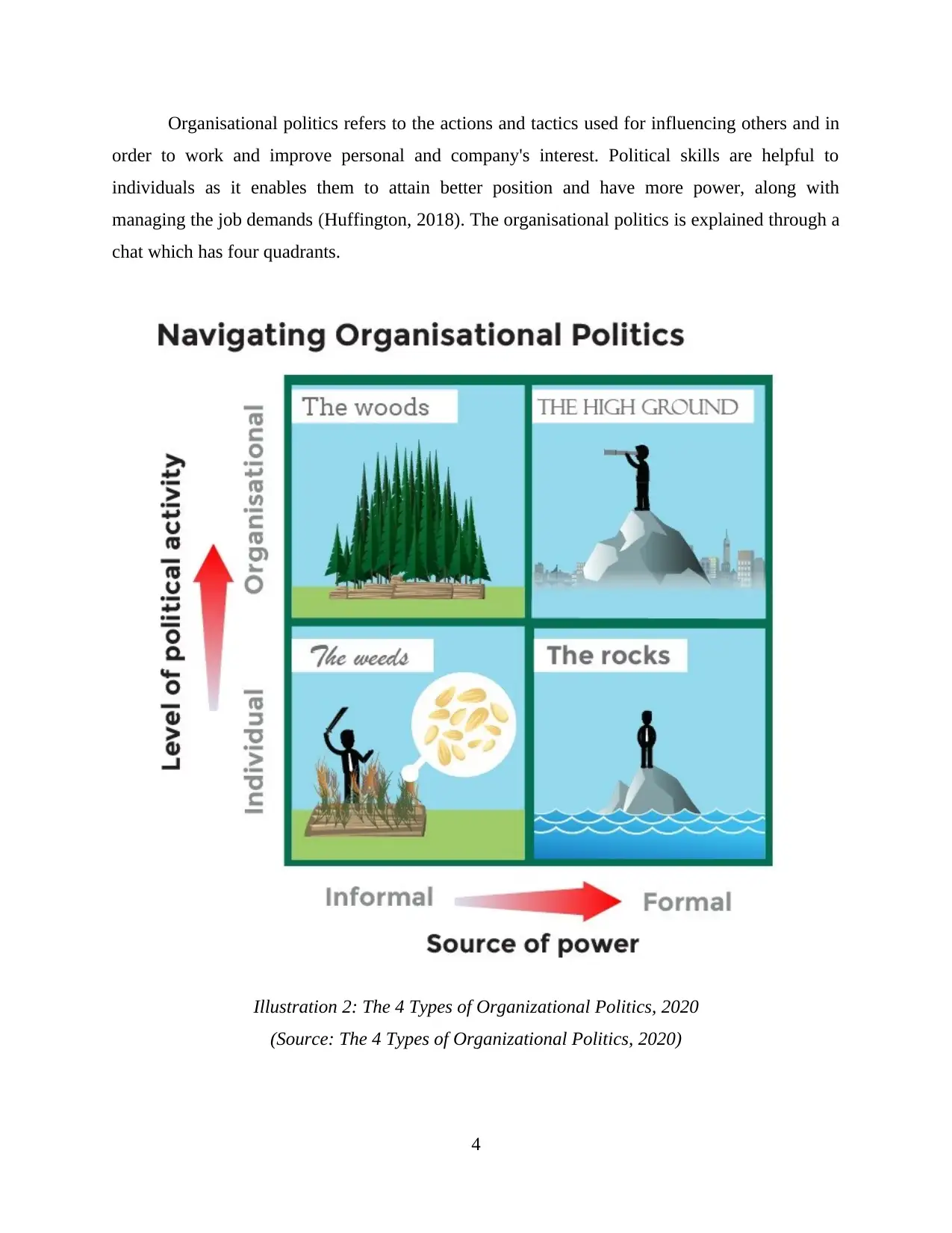
Organisational politics refers to the actions and tactics used for influencing others and in
order to work and improve personal and company's interest. Political skills are helpful to
individuals as it enables them to attain better position and have more power, along with
managing the job demands (Huffington, 2018). The organisational politics is explained through a
chat which has four quadrants.
(Source: The 4 Types of Organizational Politics, 2020)
4
Illustration 2: The 4 Types of Organizational Politics, 2020
order to work and improve personal and company's interest. Political skills are helpful to
individuals as it enables them to attain better position and have more power, along with
managing the job demands (Huffington, 2018). The organisational politics is explained through a
chat which has four quadrants.
(Source: The 4 Types of Organizational Politics, 2020)
4
Illustration 2: The 4 Types of Organizational Politics, 2020
⊘ This is a preview!⊘
Do you want full access?
Subscribe today to unlock all pages.

Trusted by 1+ million students worldwide
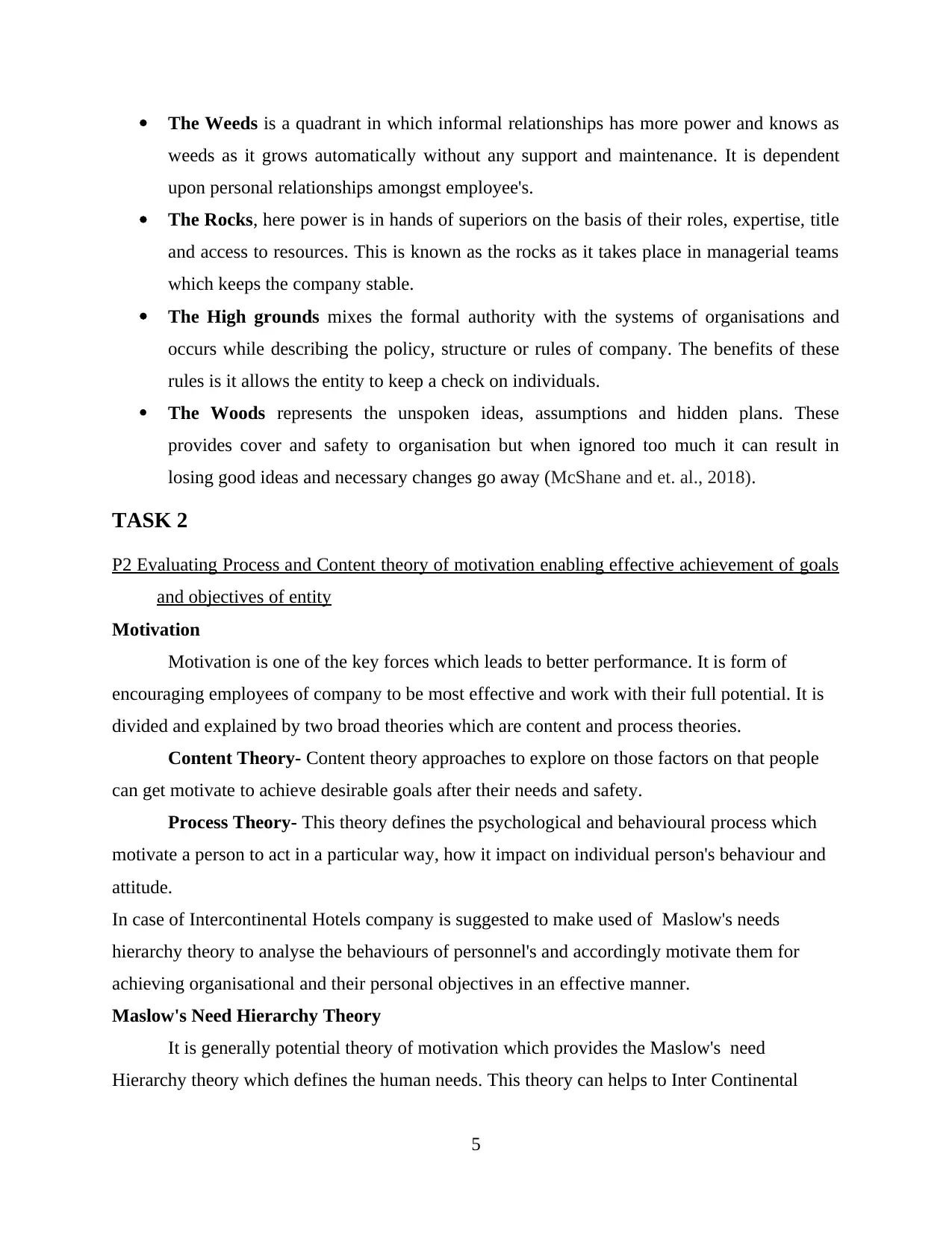
The Weeds is a quadrant in which informal relationships has more power and knows as
weeds as it grows automatically without any support and maintenance. It is dependent
upon personal relationships amongst employee's.
The Rocks, here power is in hands of superiors on the basis of their roles, expertise, title
and access to resources. This is known as the rocks as it takes place in managerial teams
which keeps the company stable.
The High grounds mixes the formal authority with the systems of organisations and
occurs while describing the policy, structure or rules of company. The benefits of these
rules is it allows the entity to keep a check on individuals.
The Woods represents the unspoken ideas, assumptions and hidden plans. These
provides cover and safety to organisation but when ignored too much it can result in
losing good ideas and necessary changes go away (McShane and et. al., 2018).
TASK 2
P2 Evaluating Process and Content theory of motivation enabling effective achievement of goals
and objectives of entity
Motivation
Motivation is one of the key forces which leads to better performance. It is form of
encouraging employees of company to be most effective and work with their full potential. It is
divided and explained by two broad theories which are content and process theories.
Content Theory- Content theory approaches to explore on those factors on that people
can get motivate to achieve desirable goals after their needs and safety.
Process Theory- This theory defines the psychological and behavioural process which
motivate a person to act in a particular way, how it impact on individual person's behaviour and
attitude.
In case of Intercontinental Hotels company is suggested to make used of Maslow's needs
hierarchy theory to analyse the behaviours of personnel's and accordingly motivate them for
achieving organisational and their personal objectives in an effective manner.
Maslow's Need Hierarchy Theory
It is generally potential theory of motivation which provides the Maslow's need
Hierarchy theory which defines the human needs. This theory can helps to Inter Continental
5
weeds as it grows automatically without any support and maintenance. It is dependent
upon personal relationships amongst employee's.
The Rocks, here power is in hands of superiors on the basis of their roles, expertise, title
and access to resources. This is known as the rocks as it takes place in managerial teams
which keeps the company stable.
The High grounds mixes the formal authority with the systems of organisations and
occurs while describing the policy, structure or rules of company. The benefits of these
rules is it allows the entity to keep a check on individuals.
The Woods represents the unspoken ideas, assumptions and hidden plans. These
provides cover and safety to organisation but when ignored too much it can result in
losing good ideas and necessary changes go away (McShane and et. al., 2018).
TASK 2
P2 Evaluating Process and Content theory of motivation enabling effective achievement of goals
and objectives of entity
Motivation
Motivation is one of the key forces which leads to better performance. It is form of
encouraging employees of company to be most effective and work with their full potential. It is
divided and explained by two broad theories which are content and process theories.
Content Theory- Content theory approaches to explore on those factors on that people
can get motivate to achieve desirable goals after their needs and safety.
Process Theory- This theory defines the psychological and behavioural process which
motivate a person to act in a particular way, how it impact on individual person's behaviour and
attitude.
In case of Intercontinental Hotels company is suggested to make used of Maslow's needs
hierarchy theory to analyse the behaviours of personnel's and accordingly motivate them for
achieving organisational and their personal objectives in an effective manner.
Maslow's Need Hierarchy Theory
It is generally potential theory of motivation which provides the Maslow's need
Hierarchy theory which defines the human needs. This theory can helps to Inter Continental
5
Paraphrase This Document
Need a fresh take? Get an instant paraphrase of this document with our AI Paraphraser
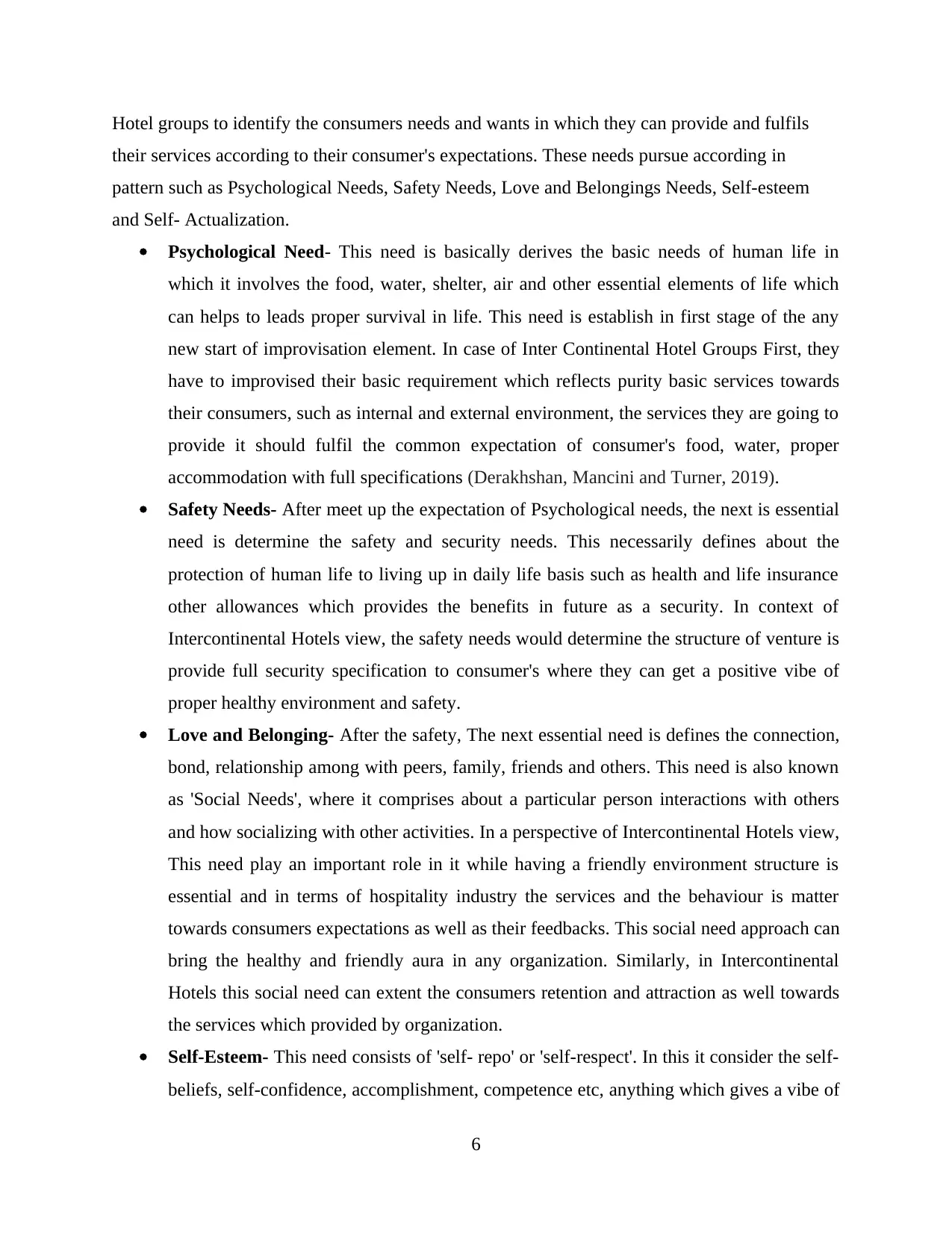
Hotel groups to identify the consumers needs and wants in which they can provide and fulfils
their services according to their consumer's expectations. These needs pursue according in
pattern such as Psychological Needs, Safety Needs, Love and Belongings Needs, Self-esteem
and Self- Actualization.
Psychological Need- This need is basically derives the basic needs of human life in
which it involves the food, water, shelter, air and other essential elements of life which
can helps to leads proper survival in life. This need is establish in first stage of the any
new start of improvisation element. In case of Inter Continental Hotel Groups First, they
have to improvised their basic requirement which reflects purity basic services towards
their consumers, such as internal and external environment, the services they are going to
provide it should fulfil the common expectation of consumer's food, water, proper
accommodation with full specifications (Derakhshan, Mancini and Turner, 2019).
Safety Needs- After meet up the expectation of Psychological needs, the next is essential
need is determine the safety and security needs. This necessarily defines about the
protection of human life to living up in daily life basis such as health and life insurance
other allowances which provides the benefits in future as a security. In context of
Intercontinental Hotels view, the safety needs would determine the structure of venture is
provide full security specification to consumer's where they can get a positive vibe of
proper healthy environment and safety.
Love and Belonging- After the safety, The next essential need is defines the connection,
bond, relationship among with peers, family, friends and others. This need is also known
as 'Social Needs', where it comprises about a particular person interactions with others
and how socializing with other activities. In a perspective of Intercontinental Hotels view,
This need play an important role in it while having a friendly environment structure is
essential and in terms of hospitality industry the services and the behaviour is matter
towards consumers expectations as well as their feedbacks. This social need approach can
bring the healthy and friendly aura in any organization. Similarly, in Intercontinental
Hotels this social need can extent the consumers retention and attraction as well towards
the services which provided by organization.
Self-Esteem- This need consists of 'self- repo' or 'self-respect'. In this it consider the self-
beliefs, self-confidence, accomplishment, competence etc, anything which gives a vibe of
6
their services according to their consumer's expectations. These needs pursue according in
pattern such as Psychological Needs, Safety Needs, Love and Belongings Needs, Self-esteem
and Self- Actualization.
Psychological Need- This need is basically derives the basic needs of human life in
which it involves the food, water, shelter, air and other essential elements of life which
can helps to leads proper survival in life. This need is establish in first stage of the any
new start of improvisation element. In case of Inter Continental Hotel Groups First, they
have to improvised their basic requirement which reflects purity basic services towards
their consumers, such as internal and external environment, the services they are going to
provide it should fulfil the common expectation of consumer's food, water, proper
accommodation with full specifications (Derakhshan, Mancini and Turner, 2019).
Safety Needs- After meet up the expectation of Psychological needs, the next is essential
need is determine the safety and security needs. This necessarily defines about the
protection of human life to living up in daily life basis such as health and life insurance
other allowances which provides the benefits in future as a security. In context of
Intercontinental Hotels view, the safety needs would determine the structure of venture is
provide full security specification to consumer's where they can get a positive vibe of
proper healthy environment and safety.
Love and Belonging- After the safety, The next essential need is defines the connection,
bond, relationship among with peers, family, friends and others. This need is also known
as 'Social Needs', where it comprises about a particular person interactions with others
and how socializing with other activities. In a perspective of Intercontinental Hotels view,
This need play an important role in it while having a friendly environment structure is
essential and in terms of hospitality industry the services and the behaviour is matter
towards consumers expectations as well as their feedbacks. This social need approach can
bring the healthy and friendly aura in any organization. Similarly, in Intercontinental
Hotels this social need can extent the consumers retention and attraction as well towards
the services which provided by organization.
Self-Esteem- This need consists of 'self- repo' or 'self-respect'. In this it consider the self-
beliefs, self-confidence, accomplishment, competence etc, anything which gives a vibe of
6
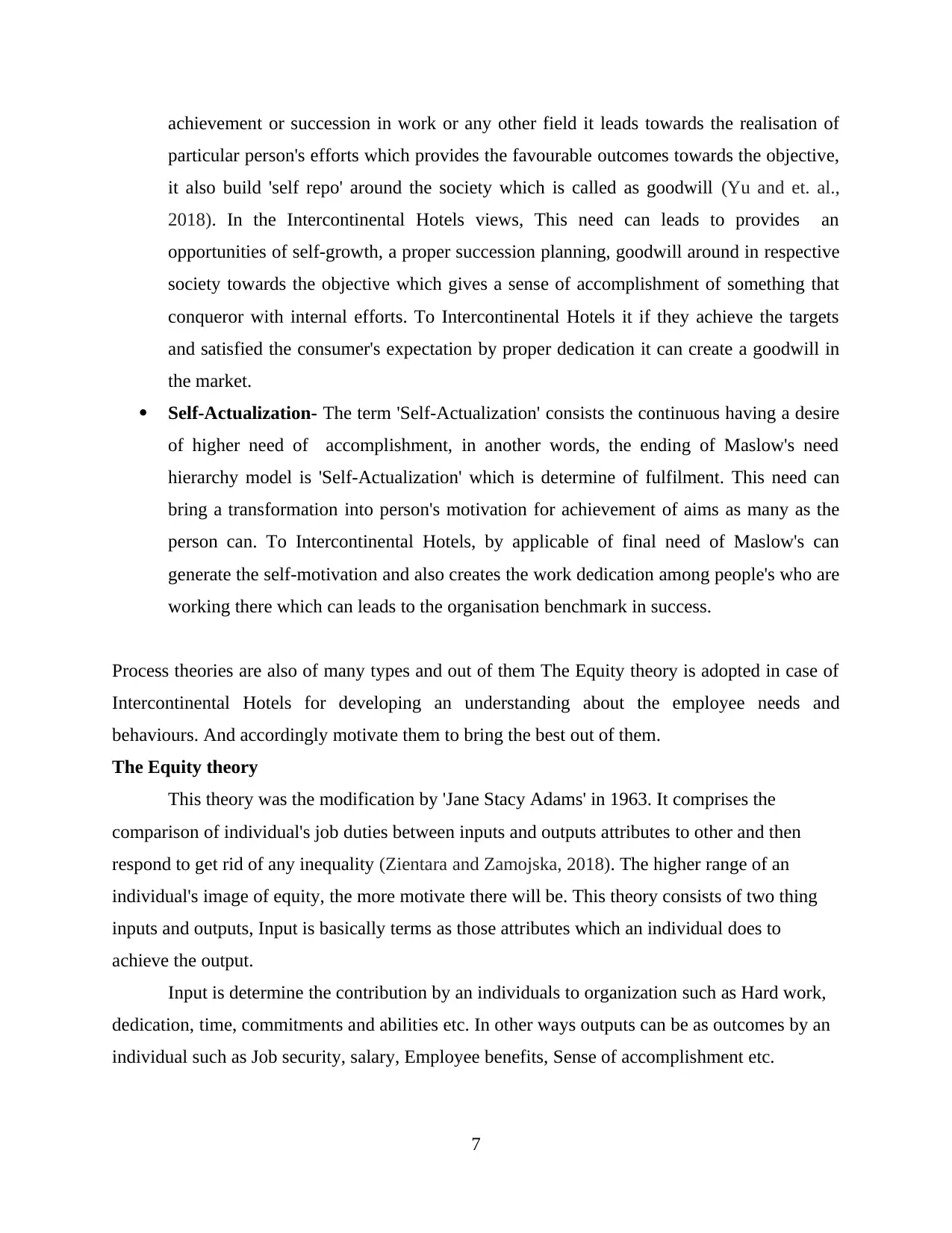
achievement or succession in work or any other field it leads towards the realisation of
particular person's efforts which provides the favourable outcomes towards the objective,
it also build 'self repo' around the society which is called as goodwill (Yu and et. al.,
2018). In the Intercontinental Hotels views, This need can leads to provides an
opportunities of self-growth, a proper succession planning, goodwill around in respective
society towards the objective which gives a sense of accomplishment of something that
conqueror with internal efforts. To Intercontinental Hotels it if they achieve the targets
and satisfied the consumer's expectation by proper dedication it can create a goodwill in
the market.
Self-Actualization- The term 'Self-Actualization' consists the continuous having a desire
of higher need of accomplishment, in another words, the ending of Maslow's need
hierarchy model is 'Self-Actualization' which is determine of fulfilment. This need can
bring a transformation into person's motivation for achievement of aims as many as the
person can. To Intercontinental Hotels, by applicable of final need of Maslow's can
generate the self-motivation and also creates the work dedication among people's who are
working there which can leads to the organisation benchmark in success.
Process theories are also of many types and out of them The Equity theory is adopted in case of
Intercontinental Hotels for developing an understanding about the employee needs and
behaviours. And accordingly motivate them to bring the best out of them.
The Equity theory
This theory was the modification by 'Jane Stacy Adams' in 1963. It comprises the
comparison of individual's job duties between inputs and outputs attributes to other and then
respond to get rid of any inequality (Zientara and Zamojska, 2018). The higher range of an
individual's image of equity, the more motivate there will be. This theory consists of two thing
inputs and outputs, Input is basically terms as those attributes which an individual does to
achieve the output.
Input is determine the contribution by an individuals to organization such as Hard work,
dedication, time, commitments and abilities etc. In other ways outputs can be as outcomes by an
individual such as Job security, salary, Employee benefits, Sense of accomplishment etc.
7
particular person's efforts which provides the favourable outcomes towards the objective,
it also build 'self repo' around the society which is called as goodwill (Yu and et. al.,
2018). In the Intercontinental Hotels views, This need can leads to provides an
opportunities of self-growth, a proper succession planning, goodwill around in respective
society towards the objective which gives a sense of accomplishment of something that
conqueror with internal efforts. To Intercontinental Hotels it if they achieve the targets
and satisfied the consumer's expectation by proper dedication it can create a goodwill in
the market.
Self-Actualization- The term 'Self-Actualization' consists the continuous having a desire
of higher need of accomplishment, in another words, the ending of Maslow's need
hierarchy model is 'Self-Actualization' which is determine of fulfilment. This need can
bring a transformation into person's motivation for achievement of aims as many as the
person can. To Intercontinental Hotels, by applicable of final need of Maslow's can
generate the self-motivation and also creates the work dedication among people's who are
working there which can leads to the organisation benchmark in success.
Process theories are also of many types and out of them The Equity theory is adopted in case of
Intercontinental Hotels for developing an understanding about the employee needs and
behaviours. And accordingly motivate them to bring the best out of them.
The Equity theory
This theory was the modification by 'Jane Stacy Adams' in 1963. It comprises the
comparison of individual's job duties between inputs and outputs attributes to other and then
respond to get rid of any inequality (Zientara and Zamojska, 2018). The higher range of an
individual's image of equity, the more motivate there will be. This theory consists of two thing
inputs and outputs, Input is basically terms as those attributes which an individual does to
achieve the output.
Input is determine the contribution by an individuals to organization such as Hard work,
dedication, time, commitments and abilities etc. In other ways outputs can be as outcomes by an
individual such as Job security, salary, Employee benefits, Sense of accomplishment etc.
7
⊘ This is a preview!⊘
Do you want full access?
Subscribe today to unlock all pages.

Trusted by 1+ million students worldwide
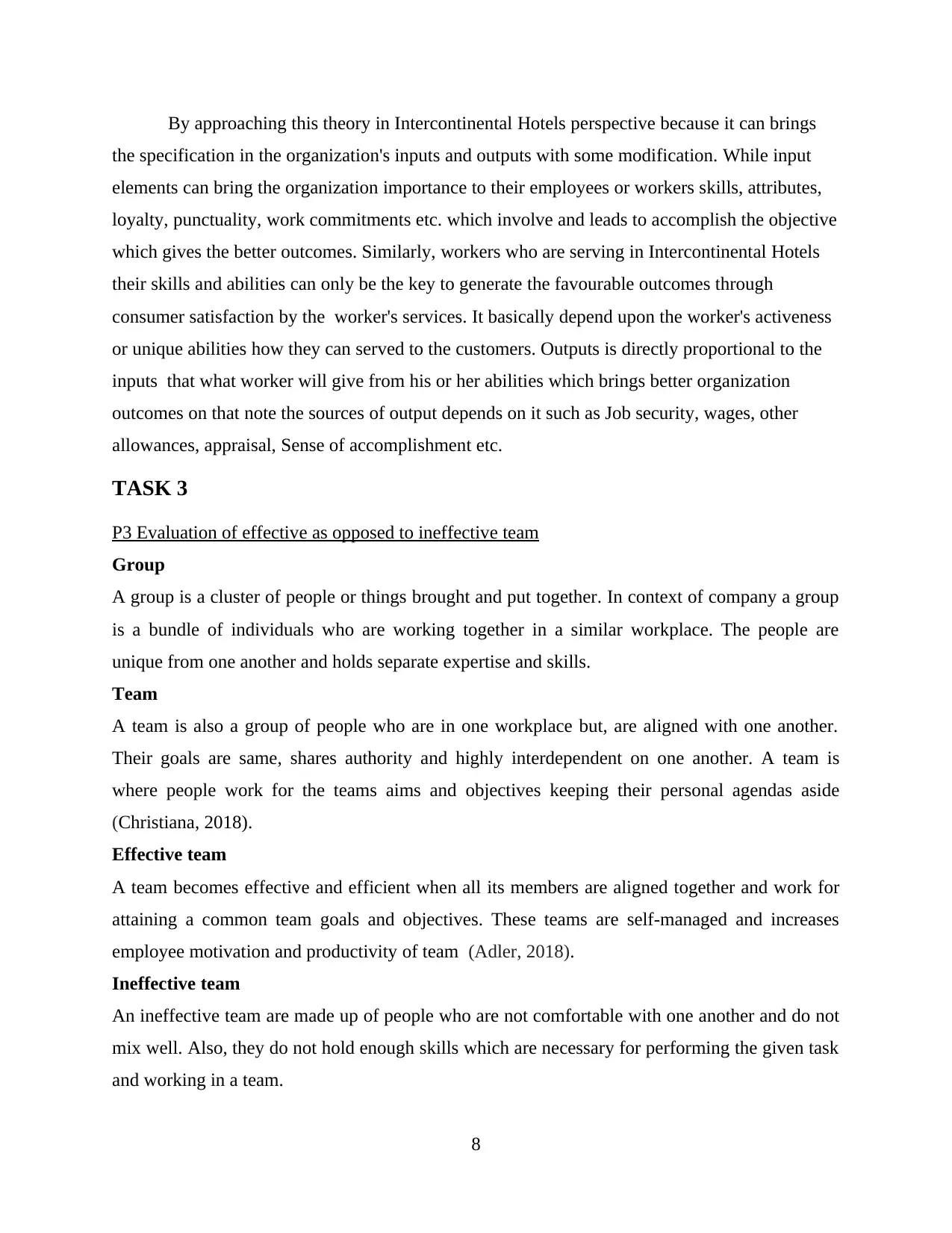
By approaching this theory in Intercontinental Hotels perspective because it can brings
the specification in the organization's inputs and outputs with some modification. While input
elements can bring the organization importance to their employees or workers skills, attributes,
loyalty, punctuality, work commitments etc. which involve and leads to accomplish the objective
which gives the better outcomes. Similarly, workers who are serving in Intercontinental Hotels
their skills and abilities can only be the key to generate the favourable outcomes through
consumer satisfaction by the worker's services. It basically depend upon the worker's activeness
or unique abilities how they can served to the customers. Outputs is directly proportional to the
inputs that what worker will give from his or her abilities which brings better organization
outcomes on that note the sources of output depends on it such as Job security, wages, other
allowances, appraisal, Sense of accomplishment etc.
TASK 3
P3 Evaluation of effective as opposed to ineffective team
Group
A group is a cluster of people or things brought and put together. In context of company a group
is a bundle of individuals who are working together in a similar workplace. The people are
unique from one another and holds separate expertise and skills.
Team
A team is also a group of people who are in one workplace but, are aligned with one another.
Their goals are same, shares authority and highly interdependent on one another. A team is
where people work for the teams aims and objectives keeping their personal agendas aside
(Christiana, 2018).
Effective team
A team becomes effective and efficient when all its members are aligned together and work for
attaining a common team goals and objectives. These teams are self-managed and increases
employee motivation and productivity of team (Adler, 2018).
Ineffective team
An ineffective team are made up of people who are not comfortable with one another and do not
mix well. Also, they do not hold enough skills which are necessary for performing the given task
and working in a team.
8
the specification in the organization's inputs and outputs with some modification. While input
elements can bring the organization importance to their employees or workers skills, attributes,
loyalty, punctuality, work commitments etc. which involve and leads to accomplish the objective
which gives the better outcomes. Similarly, workers who are serving in Intercontinental Hotels
their skills and abilities can only be the key to generate the favourable outcomes through
consumer satisfaction by the worker's services. It basically depend upon the worker's activeness
or unique abilities how they can served to the customers. Outputs is directly proportional to the
inputs that what worker will give from his or her abilities which brings better organization
outcomes on that note the sources of output depends on it such as Job security, wages, other
allowances, appraisal, Sense of accomplishment etc.
TASK 3
P3 Evaluation of effective as opposed to ineffective team
Group
A group is a cluster of people or things brought and put together. In context of company a group
is a bundle of individuals who are working together in a similar workplace. The people are
unique from one another and holds separate expertise and skills.
Team
A team is also a group of people who are in one workplace but, are aligned with one another.
Their goals are same, shares authority and highly interdependent on one another. A team is
where people work for the teams aims and objectives keeping their personal agendas aside
(Christiana, 2018).
Effective team
A team becomes effective and efficient when all its members are aligned together and work for
attaining a common team goals and objectives. These teams are self-managed and increases
employee motivation and productivity of team (Adler, 2018).
Ineffective team
An ineffective team are made up of people who are not comfortable with one another and do not
mix well. Also, they do not hold enough skills which are necessary for performing the given task
and working in a team.
8
Paraphrase This Document
Need a fresh take? Get an instant paraphrase of this document with our AI Paraphraser
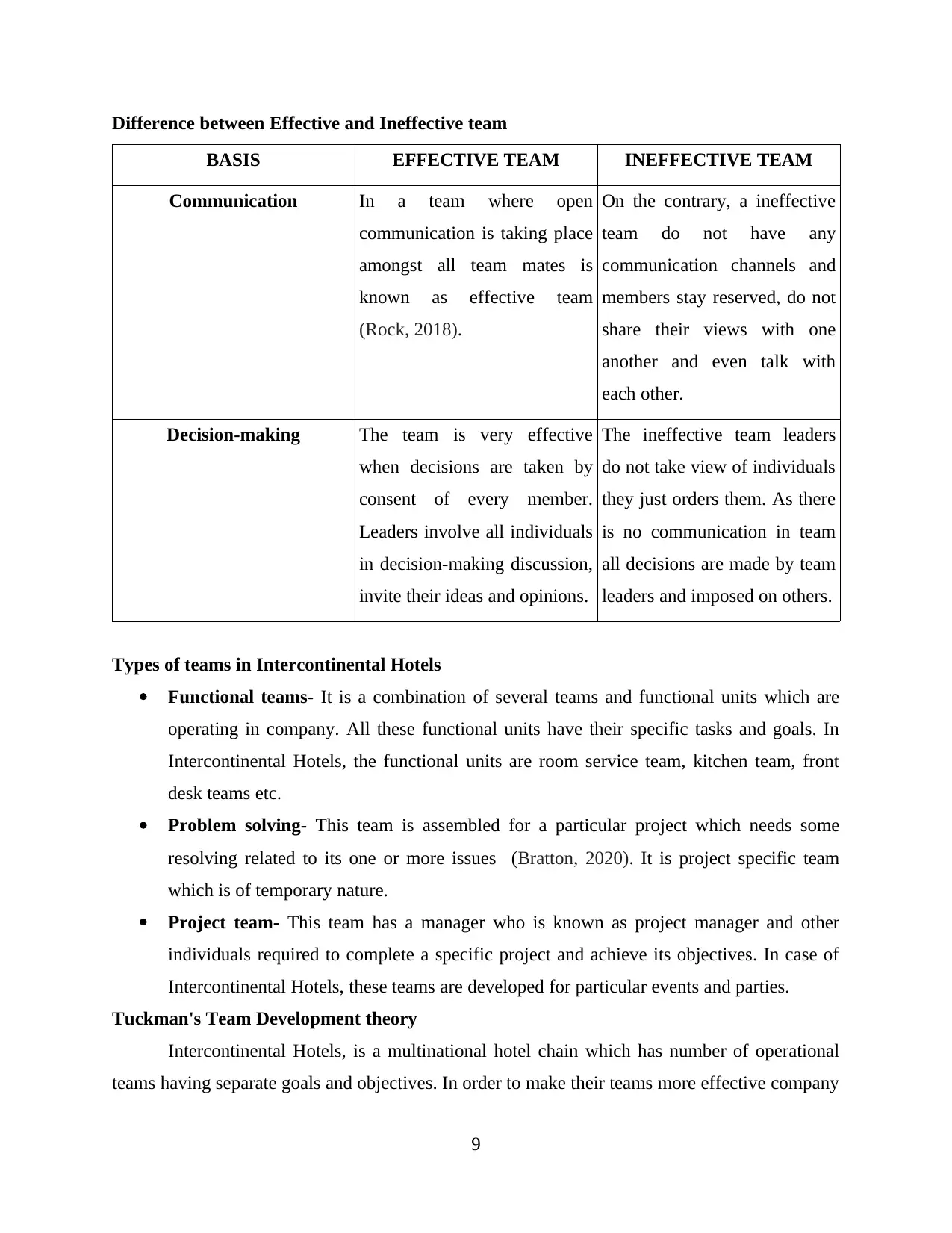
Difference between Effective and Ineffective team
BASIS EFFECTIVE TEAM INEFFECTIVE TEAM
Communication In a team where open
communication is taking place
amongst all team mates is
known as effective team
(Rock, 2018).
On the contrary, a ineffective
team do not have any
communication channels and
members stay reserved, do not
share their views with one
another and even talk with
each other.
Decision-making The team is very effective
when decisions are taken by
consent of every member.
Leaders involve all individuals
in decision-making discussion,
invite their ideas and opinions.
The ineffective team leaders
do not take view of individuals
they just orders them. As there
is no communication in team
all decisions are made by team
leaders and imposed on others.
Types of teams in Intercontinental Hotels
Functional teams- It is a combination of several teams and functional units which are
operating in company. All these functional units have their specific tasks and goals. In
Intercontinental Hotels, the functional units are room service team, kitchen team, front
desk teams etc.
Problem solving- This team is assembled for a particular project which needs some
resolving related to its one or more issues (Bratton, 2020). It is project specific team
which is of temporary nature.
Project team- This team has a manager who is known as project manager and other
individuals required to complete a specific project and achieve its objectives. In case of
Intercontinental Hotels, these teams are developed for particular events and parties.
Tuckman's Team Development theory
Intercontinental Hotels, is a multinational hotel chain which has number of operational
teams having separate goals and objectives. In order to make their teams more effective company
9
BASIS EFFECTIVE TEAM INEFFECTIVE TEAM
Communication In a team where open
communication is taking place
amongst all team mates is
known as effective team
(Rock, 2018).
On the contrary, a ineffective
team do not have any
communication channels and
members stay reserved, do not
share their views with one
another and even talk with
each other.
Decision-making The team is very effective
when decisions are taken by
consent of every member.
Leaders involve all individuals
in decision-making discussion,
invite their ideas and opinions.
The ineffective team leaders
do not take view of individuals
they just orders them. As there
is no communication in team
all decisions are made by team
leaders and imposed on others.
Types of teams in Intercontinental Hotels
Functional teams- It is a combination of several teams and functional units which are
operating in company. All these functional units have their specific tasks and goals. In
Intercontinental Hotels, the functional units are room service team, kitchen team, front
desk teams etc.
Problem solving- This team is assembled for a particular project which needs some
resolving related to its one or more issues (Bratton, 2020). It is project specific team
which is of temporary nature.
Project team- This team has a manager who is known as project manager and other
individuals required to complete a specific project and achieve its objectives. In case of
Intercontinental Hotels, these teams are developed for particular events and parties.
Tuckman's Team Development theory
Intercontinental Hotels, is a multinational hotel chain which has number of operational
teams having separate goals and objectives. In order to make their teams more effective company
9
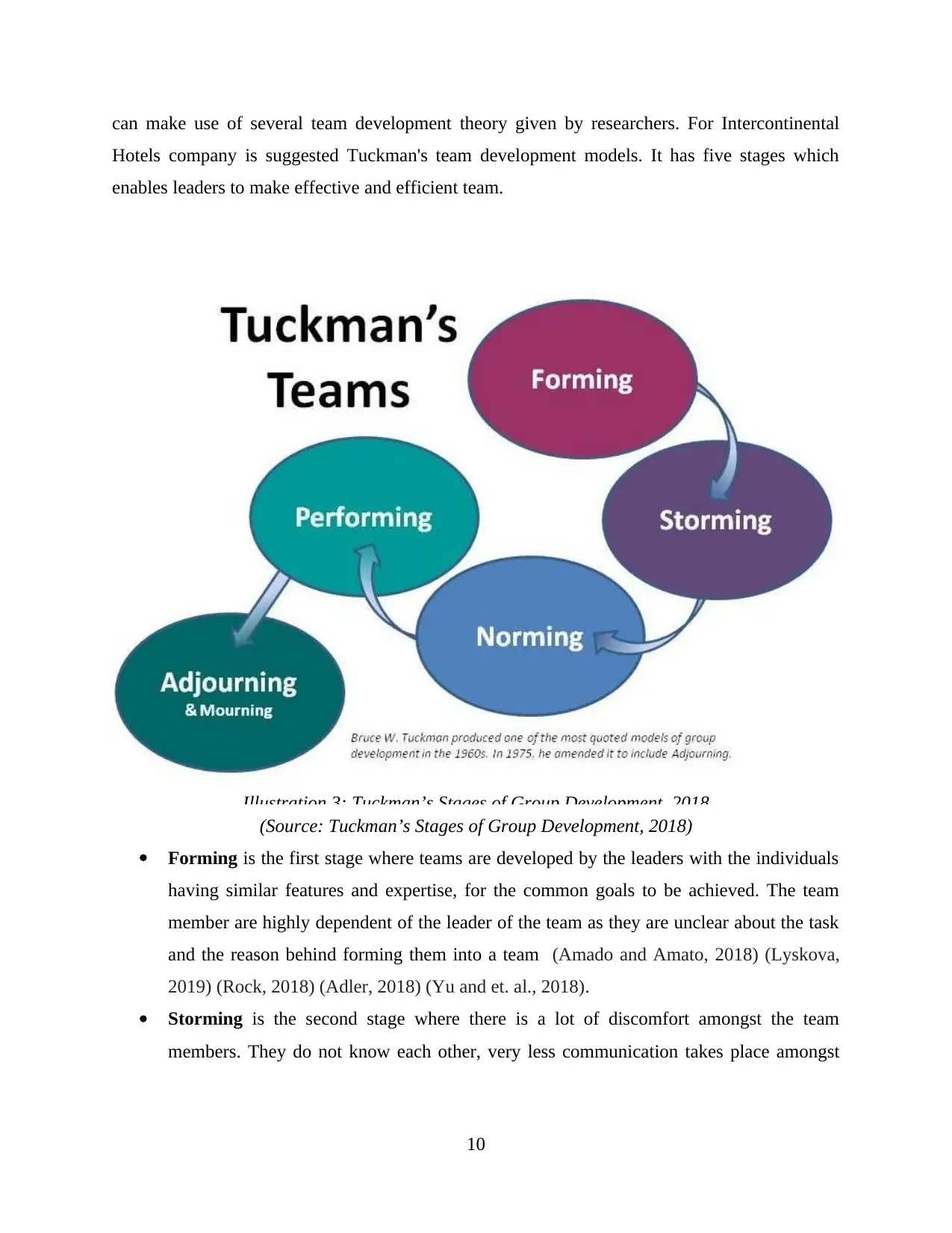
can make use of several team development theory given by researchers. For Intercontinental
Hotels company is suggested Tuckman's team development models. It has five stages which
enables leaders to make effective and efficient team.
Illustration 3: Tuckman’s Stages of Group Development, 2018
(Source: Tuckman’s Stages of Group Development, 2018)
Forming is the first stage where teams are developed by the leaders with the individuals
having similar features and expertise, for the common goals to be achieved. The team
member are highly dependent of the leader of the team as they are unclear about the task
and the reason behind forming them into a team (Amado and Amato, 2018) (Lyskova,
2019) (Rock, 2018) (Adler, 2018) (Yu and et. al., 2018).
Storming is the second stage where there is a lot of discomfort amongst the team
members. They do not know each other, very less communication takes place amongst
10
Hotels company is suggested Tuckman's team development models. It has five stages which
enables leaders to make effective and efficient team.
Illustration 3: Tuckman’s Stages of Group Development, 2018
(Source: Tuckman’s Stages of Group Development, 2018)
Forming is the first stage where teams are developed by the leaders with the individuals
having similar features and expertise, for the common goals to be achieved. The team
member are highly dependent of the leader of the team as they are unclear about the task
and the reason behind forming them into a team (Amado and Amato, 2018) (Lyskova,
2019) (Rock, 2018) (Adler, 2018) (Yu and et. al., 2018).
Storming is the second stage where there is a lot of discomfort amongst the team
members. They do not know each other, very less communication takes place amongst
10
⊘ This is a preview!⊘
Do you want full access?
Subscribe today to unlock all pages.

Trusted by 1+ million students worldwide
1 out of 16
Related Documents
Your All-in-One AI-Powered Toolkit for Academic Success.
+13062052269
info@desklib.com
Available 24*7 on WhatsApp / Email
![[object Object]](/_next/static/media/star-bottom.7253800d.svg)
Unlock your academic potential
Copyright © 2020–2026 A2Z Services. All Rights Reserved. Developed and managed by ZUCOL.





